UNRVL9-Project1
Tuesday 13/10/2020
References
— https://en.wikipedia.org/wiki/Jeremiah_Denton
— https://learn.adafruit.com/chatty-light-up-cpx-mask
— https://learn.adafruit.com/anatomical-3d-printed-beating-heart-with-makecode
— https://learn.adafruit.com/sound-activated-shark-mask
Alternative Greetings
We talked about the scale of greetings from intimate to formal and how to represent that. Greetings can be awkward if you don't have the same expectations. A conversation about the greeting habits of your new lovers family can be useful to avoid very awkward semi-hand-shake-kiss-hug-situations.
How will greetings evolve after Corona? Will they fade? Will we greet more extreme because we missed it so much? Hugging as much as possible to compensate the previous touchless times. Or maybe we'll act more aggressively and head bump instead of kiss.
ZOOM GREETINGS
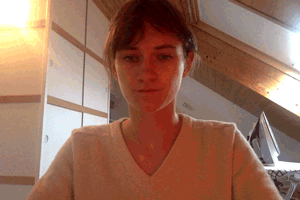
Wiping the camera to show respect. How many times you wipe it, what you wipe it with indicate levels of respect. You can customize your wipe pattern like you can a secret handshake with a friend.
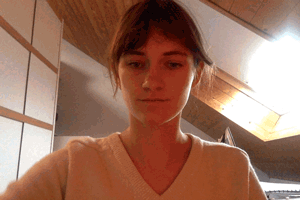
Bowing your camera indicates respect because you can see if someone took the effort to put on pants to meet you.
PERSONAL GREETINGS
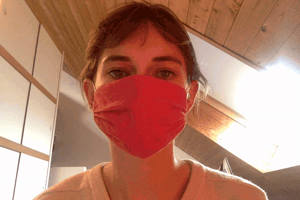
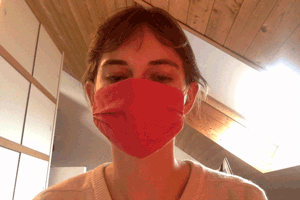
Using the eyes and eyebrows because you can't touch others or see their mouth. Eyebrow raise could indicate a smile or a hello, the amount of times raised indicate the scale from intimate to formal.
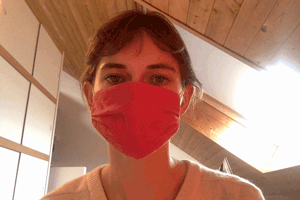
The ultimate sign of respect could be to close eyes and raise eyebrows to show you really trust someone, like for a grandparent.
involving the CIRCUIT PLAYGROUND
How can we convert a scale of intimacy while greeting another person by using color, speed, pattern, tonal value of sound?
The digital version of our wipe-your-camera-idea would be wiping the circuit instead of your camera. It would light up in more warm or cold tones to visualize a different level of intimacy. A blue wave would be a formal greeting, a handshake. A red wave would be a tight hug.
Questions
How can we show non-verbal types of conversation without being present?
- 1. What is beyond the frame? Can we experiment with the viewport of our camera?
- You only see one square cut out of someone's environment when you're zooming. A ::glimpse of your surroundings are shown when you are switching places. This is nice.
- We can use a servo motor? Processing?
- 2. What is the energy in the room?
- 3. How can we get a better sense of spacial location?
- 4. What is the output?
- 5. Can we transfer sight into something more abstract?
Wednesday 14/10/2020
References
— https://www.pretotyping.org/
— https://lauren-mccarthy.com/us
Thoughts
Wednesday we talked about the different types of greeting then we eventually transitioned to talking about body language and how you can't read body language through a video screen. We had decided to use motion detection under the table to show the movement. That data would relate to emotions, like shaking your foot violently indicates impatience and other things along that line. These movements would be translated into colors varying from warm to cool colors depending on what the movement indicated. We would also use processing to create a shape that would change from soft to sharp depending on the mood the sensor is conveying.
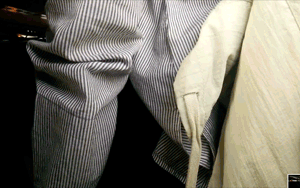
As an experiment we filmed parts of ourselves that is not visible during a Zoom call.
Question
How are we going to detect body language?
- 1. Different wearables attached to different body parts (fout, hand, head?) can give us input.
Thursday 15/10/2020
References and sources
— https://en.wikipedia.org/wiki/Synesthesia
— http://soundbible.com/tags-water.html
Updating our concept
We specified our idea. Our concept will focus on the level of attention in a context of a meeting. It will mainly be useful for a meeting where there is one person speaking and several others listening. The tool we're making is helping the speaker feeling more confident about presenting by making it possible to detect body language of interested listeners. It helps you noticing if one is fading away during a presentation. For listeners it's a tool helping you being aware of your own interest during a reading or workshop.
Work Marathon
The Drop (3D-model)
Anna Beirinckx & Yingzhou Chen









Coding (Processing and Python)
Mats Cornegoor, Cato Speltincx & Giovanni Zanella

Visualisation
Yingzhou Chen, Soo Seng & Ana Tobin